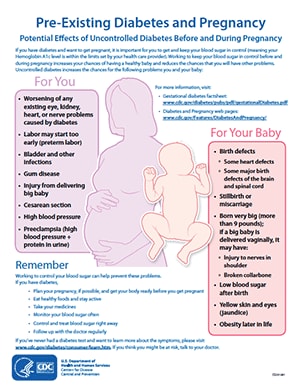Type 1 or Type 2 Diabetes and Pregnancy
Problems of Diabetes in Pregnancy

Blood sugar that is not well controlled in a pregnant woman with Type 1 or Type 2 diabetes could lead to problems for the woman and the baby:
Birth Defects
The organs of the baby form during the first two months of pregnancy, often before a woman knows that she is pregnant. Blood sugar that is not in control can affect those organs while they are being formed and cause serious birth defects in the developing baby, such as those of the brain, spine, and heart.
An Extra Large Baby
Diabetes that is not well controlled causes the baby’s blood sugar to be high. The baby is “overfed” and grows extra large. Besides causing discomfort to the woman during the last few months of pregnancy, an extra large baby can lead to problems during delivery for both the mother and the baby. The mother might need a C-Section to deliver the baby. The baby can be born with nerve damage due to pressure on the shoulder during delivery.
C- Section (Cesarean Section)
A C-section is a surgery to deliver the baby through the mother’s belly. A woman who has diabetes that is not well controlled has a higher chance of needing a C-section to deliver the baby. When the baby is delivered by a C-section, it takes longer for the woman to recover from childbirth.
High Blood Pressure (Preeclampsia)
When a pregnant woman has high blood pressure, protein in her urine, and often swelling in fingers and toes that doesn’t go away, she might have preeclampsia. It is a serious problem that needs to be watched closely and managed by her doctor. High blood pressure can cause harm to both the woman and her unborn baby. It might lead to the baby being born early and also could cause seizures or a stroke (a blood clot or a bleed in the brain that can lead to brain damage) in the woman during labor and delivery. Women with type 1 or type 2 diabetes have high blood pressure more often than women without diabetes.
Early (Preterm) Birth
Being born too early can result in problems for the baby, such as breathing problems, heart problems, bleeding into the brain, intestinal problems, and vision problems. Women with type 1 or type 2 diabetes are more likely to deliver early than women without diabetes.
Low Blood Sugar (Hypoglycemia)
People with diabetes who take insulin or other diabetes medications can develop blood sugar that is too low. Low blood sugar can be very serious, and even fatal, if not treated quickly. Seriously low blood sugar can be avoided if women watch their blood sugar closely and treat low blood sugar early.
If a woman’s diabetes was not well controlled during pregnancy, her baby can very quickly develop low blood sugar after birth. The baby’s blood sugar must be watched for several hours after delivery.
Miscarriage or Stillbirth
A miscarriage is a loss of the pregnancy before 20 weeks. Stillbirth means that after 20 weeks, the baby dies in the womb. Miscarriages and stillbirths can happen for many reasons. A woman who has diabetes that is not well controlled has a higher chance of having a miscarriage or stillbirth.
7 Tips for Women with Diabetes
If a woman with diabetes keeps her blood sugar well controlled before and during pregnancy, she can increase her chances of having a healthy baby. Controlling blood sugar also reduces the chance that a woman will develop common problems of diabetes, or that the problems will get worse during pregnancy.
Steps women can take before and during pregnancy to help prevent problems:
- Plan for Pregnancy
Before getting pregnant, see your doctor. The doctor needs to look at the effects that diabetes has had on your body already, talk with you about getting and keeping control of your blood sugar, change medications if needed, and plan for frequent follow-up. If you are overweight, the doctor might recommend that you try to lose weight before getting pregnant as part of the plan to get your blood sugar in control.

- See Your Doctor Early and OftenDuring pregnancy, a woman with diabetes needs to see the doctor more often than a pregnant woman without diabetes. Together, you and your doctor can work to prevent or catch problems early.
- Eat Healthy Foods
Eat healthy foods from a meal plan made for a person with diabetes. A dietitian can help you create a healthy meal plan. A dietitian can also help you learn how to control your blood sugar while you are pregnant.
Tasty Recipes for People with Diabetes and Their Families »
To Find a Dietitian:
American Dietetic Association
1–800–877–1600
www.eatright.org (click on “Find an Expert”) - Exercise RegularlyExercise is another way to keep blood sugar under control. It helps to balance food intake. After checking with your doctor, you can exercise regularly before, during, and after pregnancy. Get at least 30 minutes of moderate-intensity physical activity at least five days a week. This could be brisk walking, swimming, or actively playing with children.
Learn more about physical activity during pregnancy » - Take Pills and Insulin As DirectedIf diabetes pills or insulin are ordered by your doctor, take it as directed in order to help keep your blood sugar under control.
- Control and Treat Low Blood Sugar QuicklyKeeping blood sugar well controlled can lead to a chance of low blood sugar at times. If you are taking diabetes pills or insulin, it’s helpful to have a source of quick sugar, such as hard candy, glucose tablets or gel, on hand at all times. It’s also good to teach family members and close co-workers or friends how to help in case of a severe low blood sugar reaction.
- Monitor Blood Sugar OftenBecause pregnancy causes the body’s need for energy to change, blood sugar levels can change very quickly. You need to check your blood sugar often, as directed by your doctor. It is important to learn how to adjust food intake, exercise, and insulin, depending on the results of your blood sugar tests.
Learn how to take control of your diabetes »
More Information

Got diabetes? Thinking about having a baby? [PDF – 1 MB]
View, download, and print this brochure about diabetes and pregnancy.
View, download, and print this brochure about diabetes and pregnancy.
For information on how to keep blood sugar well controlled, visit the American Diabetes Association website.




































No hay comentarios:
Publicar un comentario